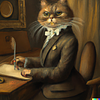Take a photo of a barcode or cover
fast-paced
it almost felt like reading my brain
really really strong observational writing, really interesting turns of phrase, pretty plotless so it doesn't read that fast
really really strong observational writing, really interesting turns of phrase, pretty plotless so it doesn't read that fast
3.5
I think Tortoise Dream's review sums up most of my thought process in regard to Keun's novel, except I find the general silence to be an interesting tactic for Keun in embodying Ferdinand's psyche. He, a German POW, is struggling in postwar Cologne, and he reflects on the nostalgia of the past, including a single moment of his life being saved during the war, eliding (and most likely repressing) and grander discourse as to the WWII and the traumas that came with it on an individual and wider social level. I find this probable due to the intermittent descriptions of sections of the city having been bombed, or one of the many characters' mini-narratives revealing a horror of the rampant bombings in the area. There's no allegory to be found here, but there's so much acerbity in Keun's considerations of the superficiality of postwar industriousness and the hopes for capitalist gain to reap psychological benefit (national/personal healing). This is shown mainly through Liebezahl in his rapidly growing business of pseudoscience, astrology, color therapy, and more to appease the hopeful locals that just want some sort of aid in the meandering toiling that is the postwar German experience.
Note on the translation: Early on, there are translated excerpts of poems printed in English with their translations in footnotes. The translation in general seems adept at matching Keun's vibe and general diction that I remember from reading Das kunstseidene Mädchen in German. But, oh my god, the translations of the poems are TERRIBLE. So strangely done. Entirely different diction is used to the point that it seems that emulation of the original wasn't even attempted. Odd. Otherwise, it all seemed fine.
I think Tortoise Dream's review sums up most of my thought process in regard to Keun's novel, except I find the general silence to be an interesting tactic for Keun in embodying Ferdinand's psyche. He, a German POW, is struggling in postwar Cologne, and he reflects on the nostalgia of the past, including a single moment of his life being saved during the war, eliding (and most likely repressing) and grander discourse as to the WWII and the traumas that came with it on an individual and wider social level. I find this probable due to the intermittent descriptions of sections of the city having been bombed, or one of the many characters' mini-narratives revealing a horror of the rampant bombings in the area. There's no allegory to be found here, but there's so much acerbity in Keun's considerations of the superficiality of postwar industriousness and the hopes for capitalist gain to reap psychological benefit (national/personal healing). This is shown mainly through Liebezahl in his rapidly growing business of pseudoscience, astrology, color therapy, and more to appease the hopeful locals that just want some sort of aid in the meandering toiling that is the postwar German experience.
Note on the translation: Early on, there are translated excerpts of poems printed in English with their translations in footnotes. The translation in general seems adept at matching Keun's vibe and general diction that I remember from reading Das kunstseidene Mädchen in German. But, oh my god, the translations of the poems are TERRIBLE. So strangely done. Entirely different diction is used to the point that it seems that emulation of the original wasn't even attempted. Odd. Otherwise, it all seemed fine.
Roman im für Irmgard Keun recht typischen stream of consciousness Stil, passagenweise wirklich sehr witzig und treffsicher ironisch. In die Geschichte selbst bin ich aber leider nicht so ganz hineingekommen, da ich den Eindruck hatte, dass es nicht wirklich einen klaren Handlungsstrang gibt.
adventurous
dark
funny
medium-paced
I very much enjoyed this darkly humorous, often discursive and always philosophical novella about a German POW's attempt to find meaning in his life once he attains his freedom. The story is filled with wry, sometimes sad and sometimes snarkily hilarious observations on his experiences as a youth, bookseller, conscript, POW and 'returnee ". It was a pleasure to read and I look forward to discovering more of Keun's work.
“When I think about how many times I exist, I have to wonder whether I even exist at all. // I feel so deep-frozen. I wonder if I’ll ever thaw out in this life.”
funny
lighthearted
medium-paced
Mostly humorous/satirical, this book is about the lives of several people in post-WWII Germany.
funny
lighthearted
reflective
medium-paced
Plot or Character Driven:
Character
Strong character development:
No
Loveable characters:
Yes
Flaws of characters a main focus:
Complicated




